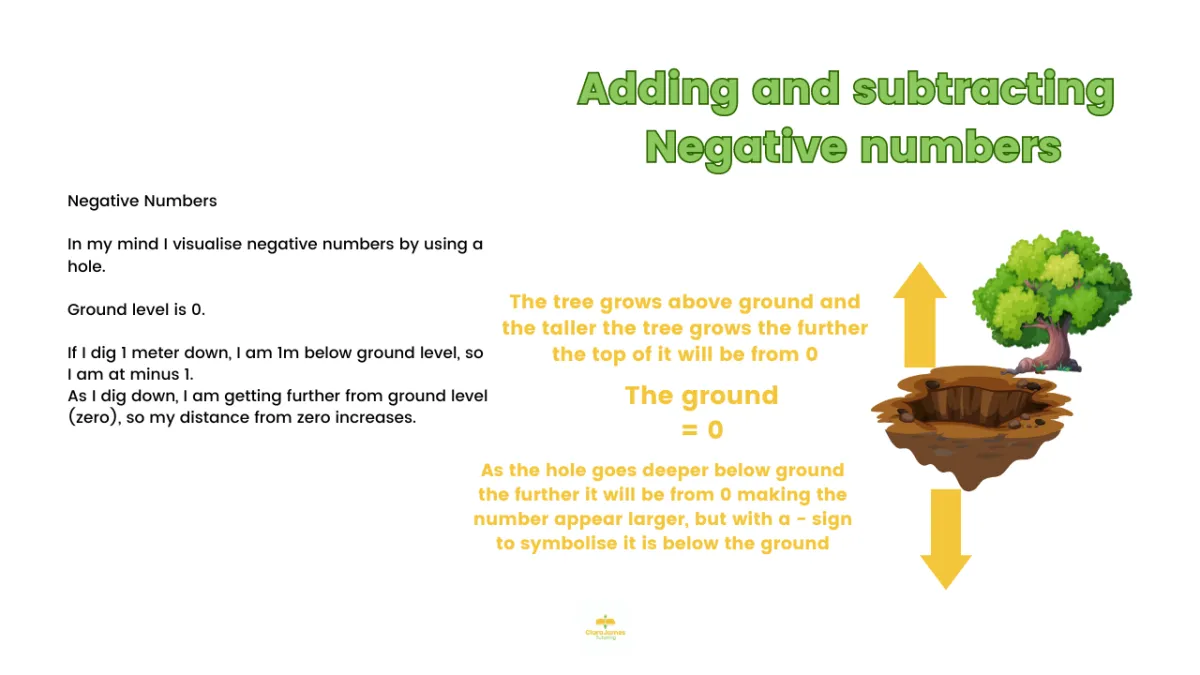Clara James Franchise
BLOG POSTS

Nothing Nice About Negative Numbers!
Nothing Nice About Negative Numbers
Yesterday I was working with a lad on negative numbers. I got the overall view that his opinion is that there is nothing nice at all about negative numbers!
I think this was worsened by the fact that his brain was still very much in holiday mode.
But I did wonder whether it would be worth just going over them again.
If we start with the question: 5-2:
You could probably answer this instinctively: Start with 5 and take 2 a way (move back 2 towards zero) to get the answer of 3.
0 0 0 0 0
5
00 000
3
However, if this was rearranged to have -2+5 it seems far more challenging!
What I suggest is that you draw or imagine a number line. The -2 gives you your starting point. Because we are adding move up the number line to the right →
Last night it was minus 2 degrees, and it got 5 degrees warmer. So, as we move up past the 0 and finish on the 3.
That’s our answer.

As our next example we could use the question, -2 -5.
Once again imagine (or draw) the number line. Your starting point is -2. This time it tells us to minus (or take) 5. So, we need to head left ← down the number line. In effect it’s getting colder.
Our answer would be -7.

Hopefully this is making sense.
Our next example might be 2-+5.
If you have a – and a + together, the minus always wins. It’s like an unfair arm wrestle with the – being the stronger contestant. You know the score before you’ve even started.
You can ignore the + and focus on the -, giving us the question 2-5.
Start at 2 on the number line and move left (because we are subtracting) down past zero to minus 3.
The next example could be 2- -5.
Here we have 2 negative signs together.
Please excuse my logic but it works for me…
When they are together, they feel positive, so it becomes an addition sum, giving us 2+5, which is the same as 7.
2 negatives TOGETHER make a positive / an addition question.
Next, we can move on to multiplying.

If we are multiplying a positive by a negative the answer will be negative:
3x-5 = -15
-3x 5 = -15
1 negative in a multiplication question gives you a negative answer.
If we are multiplying 2 negatives together, we are again feeling more positive, giving us a positive answer:
-3 x -5 = 15
-5 x -3 = 15

Finally, we can move on to division. This is like multiplication. If we have 1 negative number in the question, we will have a negative answer:
-15 ÷ 5 = -3
-15 ÷ 3 =-5
And again, 2 negatives in the question will give us a positive answer:
-15 ÷ -3 = 5
-15 ÷ =3 = 5
It works like this because if we worked the question backwards, we would in effect be doing the inverse (opposite) which is the same as multiplying.
I hope at least some of that made sense.
When you are practicing negative numbers, I would recommend drawing yourself a bright colourful number line that you can move up and down, also have fact sheets of the rules so that you can remind yourself of them when needed. That way you just need to focus on the actual maths and not the multiple different rules involved.
The games we would use would probably involve Ludo, snakes and ladders, and a board game. I might also be tempted with an older child to play chess, having a different number down the side and bottom of the board, then adding them together if you land on the square that links them. I hope that makes sense, a bit like you would read coordinates on a graph.
Each week we send out an email supporting some aspects of primary maths or English (Monday) or secondary (Thursday) maths or English. If you would like to receive either, please do let me know and I will make sure you get them: [email protected]
I hope it helps

